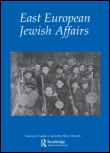
East European Jewish Affairs
Scope & Guideline
Delving into the Cultural Dynamics of East European Jewry
Introduction
Aims and Scopes
- Historical Research:
The journal publishes extensive historical studies that explore the experiences of Jewish communities in Eastern Europe, particularly during significant historical upheavals such as the Holocaust and the communist era. - Cultural Analysis:
There is a consistent focus on the cultural dimensions of Jewish life, including literature, art, and memory, examining how these elements reflect and influence Jewish identity and history. - Social History:
The journal emphasizes social history, exploring the socio-economic conditions and political dynamics affecting Jewish communities, particularly in Poland and the broader Eastern European context. - Archival Studies:
Research utilizing archival materials plays a crucial role in the journal, with many articles drawing on previously unexplored documents to shed light on Jewish historical narratives. - Interdisciplinary Approaches:
The journal encourages interdisciplinary research, integrating perspectives from sociology, anthropology, and literary studies to provide a comprehensive understanding of Jewish affairs.
Trending and Emerging
- Holocaust Studies and Memory:
There is an increasing focus on Holocaust studies, particularly in terms of memory, testimony, and the impact of historical trauma on contemporary Jewish identity. - Gender and Jewish Identity:
Emerging themes include the intersection of gender and Jewish identity, exploring the roles and experiences of women in Jewish history, particularly in relation to socialist movements and community dynamics. - Post-Communist Jewish Life:
Research on the experiences of Jews in post-communist Eastern Europe is gaining traction, examining how historical legacies influence current Jewish identities and community life. - Diaspora and Transnationalism:
There is a growing interest in the dynamics of Jewish diaspora communities and their transnational connections, particularly in relation to migration patterns and cultural exchanges. - Cultural Memory and Representation:
The exploration of cultural memory, including literature and art, is increasingly prominent, focusing on how Jewish narratives are constructed and represented in contemporary society.
Declining or Waning
- Pre-World War II Jewish Life:
There has been a noticeable decrease in articles focusing specifically on the pre-World War II Jewish life in Eastern Europe, suggesting a shift towards more contemporary issues and post-Holocaust narratives. - Traditional Jewish Practices:
The exploration of traditional Jewish practices and religious life seems to be less frequent, possibly overshadowed by more pressing themes related to identity, memory, and the Holocaust. - Jewish Political Movements:
Research on historical Jewish political movements, particularly those from the early 20th century, appears to be declining, indicating a potential shift towards more current political contexts. - Regional Studies of Jewish Communities:
There seems to be a waning interest in localized studies of individual Jewish communities in Eastern Europe, with a preference for broader thematic analyses.
Similar Journals
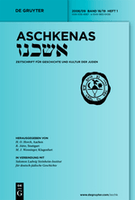
Aschkenas-Zeitschrift fuer Geschichte und Kultur der Juden
Enriching Interdisciplinary Perspectives on Jewish CultureAschkenas-Zeitschrift fuer Geschichte und Kultur der Juden, published by WALTER DE GRUYTER GMBH, is a distinguished academic journal that delves into the rich history and cultural heritage of Jewish communities. Based in Germany, this journal is indexed under the ISSN 1016-4987 and E-ISSN 1865-9438, making its contributions accessible to an international audience. Although it currently operates without open access options, the journal serves as an important platform for researchers in the fields of Arts and Humanities, History, Literature and Literary Theory, and Religious Studies, as evidenced by its publication history from 1996 to 2023. While ranked in the fourth quartile across various categories on Scopus, the journal provides critical insights and interdisciplinary approaches that enrich the understanding of Jewish cultural narratives. Researchers, professionals, and students alike will find valuable content that not only highlights historical perspectives but also engages with contemporary cultural discussions. This journal remains a vital resource for those seeking to deepen their knowledge and contribute to ongoing dialogues in Jewish studies.
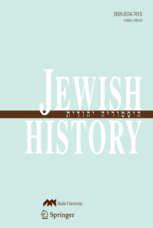
Jewish History
Charting the Course of Jewish Heritage and CultureJewish History is a significant academic journal published by Springer, focusing on the multifaceted historical narratives of Jewish communities worldwide. With roots tracing back to 1986, this esteemed journal offers an intellectual platform where researchers and scholars can engage critically with the vast and rich tapestry of Jewish heritage, culture, and experiences. Although it operates under a traditional subscription model, the journal has gained a notable standing in recent years, achieving a Q4 ranking in Cultural Studies and a Q3 ranking in History for 2023, reflecting its robust scholarly contributions. The journal is indexed in Scopus, with a rank of #808 in Arts and Humanities History and #754 in Social Sciences Cultural Studies, placing it within the competitive landscape of academic publishing. Its commitment to advancing the field of Jewish studies makes it an essential resource for researchers, professionals, and students alike, who seek to deepen their understanding of Jewish history from historical, cultural, and social perspectives.
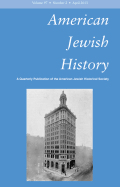
AMERICAN JEWISH HISTORY
Charting the Historical Journey of American JewsAMERICAN JEWISH HISTORY is a premier academic journal published by Johns Hopkins University Press, dedicated to the exploration and analysis of the Jewish experience in the American context. With ISSN 0164-0178 and E-ISSN 1086-3141, this journal serves as a vital resource for scholars and students in the fields of cultural studies, history, and religious studies, as evidenced by its placement in the Q3 quartile across these disciplines in 2023. Reaching a broad audience interested in the historical, social, and cultural dimensions of the American Jewish narrative, the journal has converged in various years, ensuring a robust collection of multidisciplinary research and discussions. Although it operates under a traditional subscription model, the journal remains an essential platform for critical analysis, fostering deeper understanding of Jewish identity and history. With Scopus rankings placing it at the 60th percentile in History and 62nd percentile in Religious Studies, AMERICAN JEWISH HISTORY stands as a respected publication that significantly contributes to the discourse surrounding Jewish history and culture in the United States.

Jewish Studies Quarterly
Deepening Understanding of Jewish Cultures and PracticesJewish Studies Quarterly, published by MOHR SIEBECK, is a leading academic journal dedicated to advancing scholarship in the field of Jewish studies. With its ISSN 0944-5706 and E-ISSN 1868-6788, this journal provides a platform for rigorous research that explores various dimensions of Jewish history, culture, religious practices, and contemporary issues. Although it does not currently offer open access options, it remains an essential resource for researchers, professionals, and students seeking insightful analysis and academic discourse. The journal is widely recognized for its commitment to excellence and contribution to understanding Jewish identities within global contexts. Located in Tübingen, Germany, Jewish Studies Quarterly is integral to the dialogue and scholarship surrounding Jewish thought and heritage, making it a vital reference point in the academic community.

Judaica Bohemiae
Celebrating the Legacy of Jewish Scholarship in Central EuropeJudaica Bohemiae, published by the Zidovske Muzeum Praze, is a prominent scholarly journal dedicated to the study of Jewish culture, history, and religious practices, with a particular focus on the Czech Republic and Central Europe. Since its relaunch in 2007, the journal has established itself as a valuable resource in the fields of Cultural Studies, History, and Religious Studies, achieving a commendable Q2 ranking across these disciplines in 2023. With its thoughtful compilation of research articles and critical essays, Judaica Bohemiae offers insights into the evolving dynamics of Jewish existence and identity. Although it does not currently operate under an open access model, the journal ensures that its high-quality content remains accessible to researchers, professionals, and students interested in the nuanced intersections of culture and history. By promoting rigorous academic discourse and advancing the understanding of Jewish heritage, Judaica Bohemiae continues to play a crucial role in its field, fostering scholarly connections and illuminating the past for future generations.

Zutot
Exploring the Intersection of Arts, Culture, and ReligionZutot is a distinguished academic journal published by BRILL, focusing on the multifaceted realms of Arts and Humanities, Cultural Studies, and Religious Studies. With ISSN 1571-7283 and E-ISSN 1875-0214, Zutot presents an invaluable platform for scholars seeking to explore innovative ideas and interdisciplinary approaches within these fields. Recognized within the Q4 category for its contributions to contemporary discourse, the journal ranks at the 44th percentile in Religious Studies and the 39th percentile in General Arts and Humanities, underscoring its relevance and the quality of research it publishes. Since its inception, Zutot has continued to facilitate critical dialogue and scholarship, thus acting as a crucial resource for researchers, professionals, and students alike. Its converged publication years from 2001 to 2004 and 2008 to 2024 further demonstrate its ongoing commitment to supporting rigorous academic inquiry.

Kwartalnik Historii Zydow-Jewish History Quarterly
Celebrating the Depth and Diversity of Jewish ExperiencesKwartalnik Historii Żydów - Jewish History Quarterly is a dedicated academic journal published by the esteemed Jewish Historical Institute in Warsaw, Poland. With an ISSN of 1899-3044, this quarterly publication serves as a vital platform for scholarly discourse on Jewish history, culture, and heritage. The journal aims to reflect the diversity and complexity of Jewish experiences across historical contexts, making it an essential resource for researchers, professionals, and students in the fields of History, Religious Studies, and Cultural Studies. Despite its recent coverage discontinuation in Scopus from 2012 to 2015, the journal's rankings within its respective categories indicate a modestly engaged readership and potential for contribution, particularly seen in its ranks of 339/388 in Religious Studies and 859/975 in History. Although the journal operates on a non-open access basis, its curated articles enrich the understanding of Jewish narratives and interactions within broader socio-cultural frameworks, underlining its importance in promoting historical knowledge and cultural appreciation.
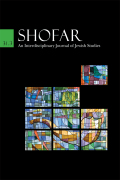
Shofar-An Interdisciplinary Journal of Jewish Studies
Illuminating Jewish Studies with Scholarly ExcellenceShofar: An Interdisciplinary Journal of Jewish Studies, published by Purdue University Press, is a prominent peer-reviewed journal that engages with the diverse and rich tapestry of Jewish studies through interdisciplinary approaches. With a focus on cultural studies, history, and religious studies, the journal has established itself within the academic community, achieving significant recognition evidenced by its Q3 ranking in these disciplines as of 2023. Researchers and scholars in the field will find valuable insights and innovative discussions that push the boundaries of traditional scholarship. Though currently not open access, Shofar offers an enriching forum for scholarly discourse that fosters a deeper understanding of Jewish identity, history, and culture, making it an essential resource for professionals and students alike. The journal's ISSN is 0882-8539, while its E-ISSN is 1534-5165. It is operational from 2014 to 2024 and is located in the United States.
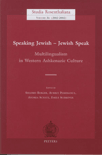
STUDIA ROSENTHALIANA
Exploring the Depths of Jewish HeritageSTUDIA ROSENTHALIANA is a distinguished journal published by Amsterdam University Press, specializing in the interdisciplinary study of Jewish culture and history, particularly as it relates to the field of Rosenthaliana, encompassing literature, art, and historical scholarship. With a robust academic legacy dating back to its inception in 1970, the journal has evolved through various publication phases, maintaining a commitment to fostering scholarly discourse and disseminating significant research. Although it does not currently participate in an open access model, STUDIA ROSENTHALIANA continues to contribute invaluable insights to the fields of Jewish studies, cultural analysis, and historical research. Researchers, professionals, and students can benefit from its comprehensive essays, critical reviews, and analytical studies that enrich our understanding of Jewish heritage and modern implications. The journal's influence and relevance in its field make it an essential resource for anyone invested in contemporary debates and analyses concerning Jewish culture and identity.
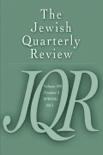
JEWISH QUARTERLY REVIEW
Engaging Minds with In-Depth Jewish ScholarshipJewish Quarterly Review, published by University of Pennsylvania Press, is a distinguished academic journal that delves into the multifaceted realms of Jewish culture, history, and religious studies. With a rich publication history dating back to 1953 and an impressive track record of rigorous scholarship, this journal maintains a Q2 ranking in key categories such as Cultural Studies, History, and Religious Studies in 2023, placing it among the top-tier journals in its field. The ISSN number 0021-6682 and the E-ISSN 1553-0604 ensure that its scholarship is widely accessible and traceable in academic databases. While the journal is not open access, it remains an essential resource for researchers, professionals, and students seeking in-depth analysis and perspectives on Jewish thought and heritage. The JQR is known for its editorial commitment to enhancing understanding and dialogue across cultural and historical contexts, making it an invaluable asset for anyone engaged in Jewish studies and related disciplines. With its headquarters in Philadelphia, PA, the journal continues to foster scholarly engagement and critical discourse on Jewish identity and experience through its carefully curated articles and reviews.